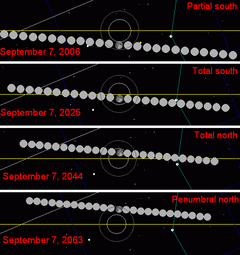March 2006 lunar eclipse
 From Wikipedia the free encyclopedia
From Wikipedia the free encyclopedia
| Penumbral lunar eclipse 14-15 March 2006 | |
|---|---|
 From Trondheim, Norway at 23:49 UTC | |
 The Moon passed right to left through the Earth's northern penumbral shadow. | |
| Series (and member) | 113 (63 of 71) |
| Gamma | 1.0210 |
| Magnitude | 1.0301 |
| Duration (hr:mn:sc) | |
| Penumbral | 4:47:27 |
| Contacts (UTC) | |
| P1 | 21:23:45 |
| Greatest | 23:47:29 |
| P4 | 2:11:12 (15 Mar) |
 The Moon's hourly motion across the Earth's shadow in the constellation of Virgo. | |
A penumbral lunar eclipse took place on 14 March 2006, the first of two lunar eclipses in 2006.
This was a relatively rare total penumbral lunar eclipse with the Moon passing entirely within the penumbral shadow without entering the darker umbral shadow. The tables below contain detailed predictions and additional information on the Penumbral Lunar Eclipse of 14 March 2006.
Visibility
[edit]It was completely visible over Africa and Europe, seen rising over eastern North America, all of South America, and setting over western Asia.


A simulated view of the Earth from the center of the Moon at maximum eclipse.
Map
[edit]Relation to other lunar eclipses
[edit]Eclipses of 2006
[edit]- A penumbral lunar eclipse on 14 March.
- A total solar eclipse on 29 March.
- A partial lunar eclipse on 7 September.
- An annular solar eclipse on 22 September.
Lunar year series (354 days)
[edit]| Lunar eclipse series sets from 2006–2009 | ||||||||
|---|---|---|---|---|---|---|---|---|
| Descending node | Ascending node | |||||||
| Saros # and photo | Date Viewing | Type Chart | Gamma | Saros # and photo | Date Viewing | Type Chart | Gamma | |
113 | 2006 Mar 14 | penumbral | 1.0211 | 118 | 2006 Sep 7 | partial | −0.9262 | |
123 | 2007 Mar 03 | total | 0.3175 | 128 | 2007 Aug 28 | total | −0.2146 | |
133 | 2008 Feb 21 | total | −0.3992 | 138 | 2008 Aug 16 | partial | 0.5646 | |
143 | 2009 Feb 09 | penumbral | −1.0640 | 148 | 2009 Aug 06 | penumbral | 1.3572 | |
| Last set | 2005 Apr 24 | Last set | 2005 Oct 17 | |||||
| Next set | 2009 Dec 31 | Next set | 2009 Jul 07 | |||||
Saros series
[edit]The eclipse belongs to Saros series 113, and is the 63rd of 71 lunar eclipses in the series. The first penumbral eclipse of saros cycle 113 began on 29 April 888 AD, first partial eclipse on 14 July 1014, and total first was on 20 March 1429. The last total eclipse occurred on 7 August 1645, last partial on 21 February 1970, and last penumbral eclipse on 10 June 2150.[1]
Half-Saros cycle
[edit]A lunar eclipse will be preceded and followed by solar eclipses by 9 years and 5.5 days (a half saros).[2] This lunar eclipse is related to two total solar eclipses of Solar Saros 120.
| 9 March 1997 | 20 March 2015 |
|---|---|
 |  |
Metonic cycles (19 years)
[edit]The Metonic cycle repeats nearly exactly every 19 years and represents a Saros cycle plus one lunar year. Because it occurs on the same calendar date, the Earth's shadow will in nearly the same location relative to the background stars.
|
|
 |
This is the first eclipse this season.
Second eclipse this season: 29 March 2006 Total Solar Eclipse
See also
[edit]- List of lunar eclipses and List of 21st-century lunar eclipses
- May 2003 lunar eclipse
- November 2003 lunar eclipse
- May 2004 lunar eclipse
- File:2006-03-14 Lunar Eclipse Sketch.gif Chart
Notes
[edit]- ^ Hermit Eclipse: Eclipse Search
- ^ Mathematical Astronomy Morsels, Jean Meeus, p.110, Chapter 18, The half-saros



